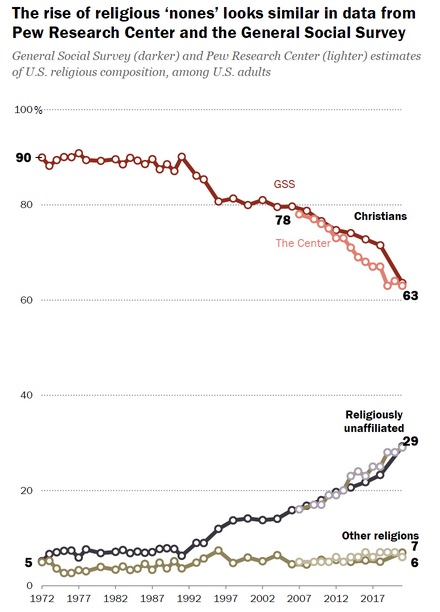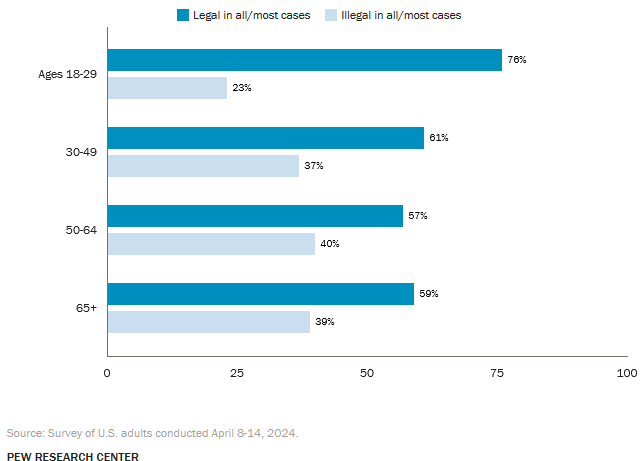The right is strongly pro-natal. Some of it is for religious reasons, some of it is because they want to control (no, don’t even, the constant talk of male leadership leaves this unquestionable), but a lot of it is that they figure if they out-breed their opponents they’ll win.
Now if you’re talking ethnicity or “race” this is indisputable. Want more whites, or latinos, or whatever, if you breed less than others, that’s going to tell.
But when you’re talking ideology and culture, it isn’t.
The anti-abortion right thinks that out-breeding will work for them, but out-breeding only works if the kids you’re popping up keep your beliefs.

Now this all very nice, and the numbers don’t look too bad, but there’s more to it than nominal membership. If you call yourself Christian but believe in abortion rights and contraception and women’s equality, you aren’t what the Christian “right” is looking for, are you?

Basically flat. What about by age?

Huh. Doesn’t look so good, does it? If you raise ’em and they don’t stay with you and you can’t convert non-members very well…
Whatever the deeper causes, religious disaffiliation in the U.S. is being fueled by switching patterns that started “snowballing” from generation to generation in the 1990s. The core population of “nones” has an increasingly “sticky” identity as it rolls forward, and it is gaining a lot more people than it is shedding, in a dynamic that has a kind of demographic momentum.
Christians have experienced the opposite pattern. With each generation, progressively fewer adults retain the Christian identity they were raised with, which in turn means fewer parents are raising their children in Christian households.
Now America’s still a very religious society. Far more so than Europe or most of the rest of the developed world.
***
(If you like the writing here, well, support it if you can. There aren’t a lot of places like this left on the Web. Every year I fundraise to keep it going. Please Subscribe or Donate.)
***
But replacement rates aren’t just about popping up babies and raising them with your beliefs. You have to be able to keep them once they’re adults. And seculars have been very, very good at converstion. Even back when everyone still said they were Christian, notice that abortion became legal, women got legal rights, contraception spread and so on. People said they were Christian, but if the Pope or their pastor said “no condoms, no pill” they ignored them.
Most people enjoy having sex. Most people, at least at some points in their lives, want to have a lot of sex, and want to do it without worrying about suddenly having to raise kids or having to go thru pregnancy.
(I often suspect that the most vehement anti-contraception and anti-abortion activists are people who are closet or in denial gays, or essentially asexual. “Sex is a duty, if we only have to have it to make babies, I won’t have to have it so often.”)
But the larger point here is that replacement rate for anything but biology is determined by ideological reproduction rates. If you can’t keep the people you raise in your ideology, then popping out more kids isn’t the solution.
Early Christians out-produced pagans, but if they hadn’t been able to keep their kids Christian: if pagans had been good at converting them, well, they would never have won.
What Christianity offers, in the US, is the church community. Church groups are one of the few social support groups left. If you need help, the church will often step up. And that makes it odd that the stickiness rate started declining in the 90s, just as government support also started a serious decline and as good jobs became harder and harder to get.
But there are other factors. One is that seculars, starting in the 70s, offered a better deal to women: a lot better deal. You could have your own bank account when married, you had no fault divorce, you could get that abortion and you didn’t have to always do what your husband said, nor did you have to marry just to get support.
Part of the secular offer became a lot better for half the population.
At the same time Christian ideology became less and less appealing. It was around the late 80s and early 90s that the hard-core Christians really began to win internal battles and made being anti-abortion the #1 litmus test, moved towards hardcore natalism and heavy parental authoritarianism with plenty of beating of children. Oh, and when all the “male leadership” stuff cropped up.
This is a better deal for some men (the one’s who like keeping their kids and wife under their thumbs with force) but it isn’t a better deal for a lot of women and kids. And when the kids grow up, well, all that heavy handed authoritarianism, justified by religion doesn’t make them think fondly of religion.
The community support deal within Christianity is a good one, but if the price is domestic violence, corporal punishment, an inferior position for women and less sex, plus more pregnancies whether you want them or not, plus more dangerous pregancies, well maybe the cost of that social support is too high?
Reproduction of groups and ideologies over time isn’t just about who bears more kids, it’s about who keeps them. If “give me the child and I’ll give you the adult works” you’re golden, but if it’s breaking down, well, you may just be producing the next generation of your ideological enemies.
Breeding isn’t enough. The life you offer has to seem better than what your opponents offer.
Churches should be cleaning up. As the last solid community support structure the offer something that almost no one else does. But at the same time as this became true they decided to be anti-sex, pro-hitting children, and for women to be subordinate to men.
Weird that more and more people don’t want that life.
